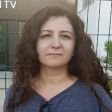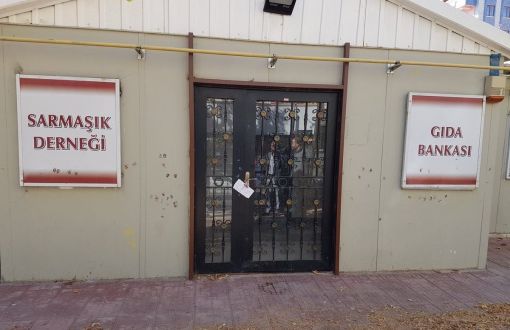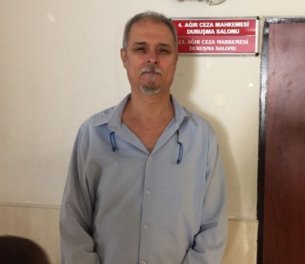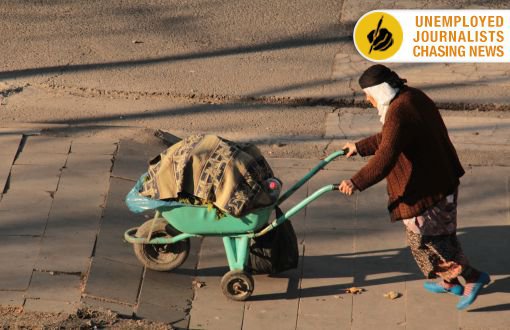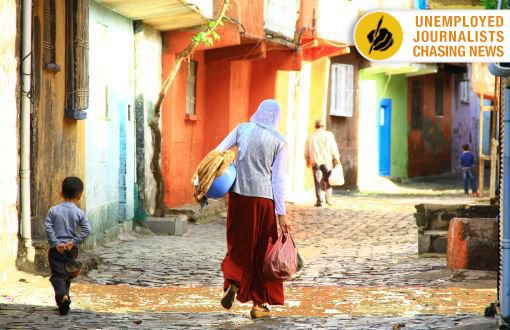FROM THE UNEMPLOYED JOURNALISTS / SARMAŞIK ASSOCIATION – 3
Sarmaşık Association is Closed; “They Are Neither Hungry nor Full”
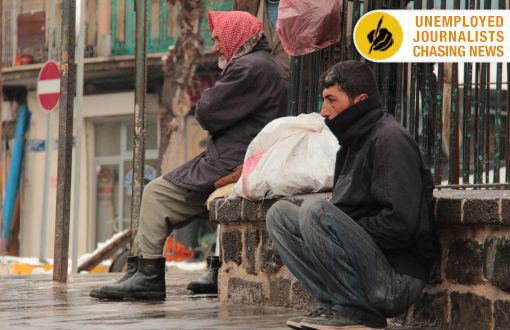
Click to read the article in Turkish and Kurdish
Doğan and Atalı families tell about their lives without aid and support after the closing down of Sarmaşık Association. Those who were receiving aid could no longer receive it following the shutting down of association with Statutory Decree no. 677. Could the municipality have such a program? We tried to reach trustee Cumali Atilla, but we could not.
Doğan family, a family of 10 speaks
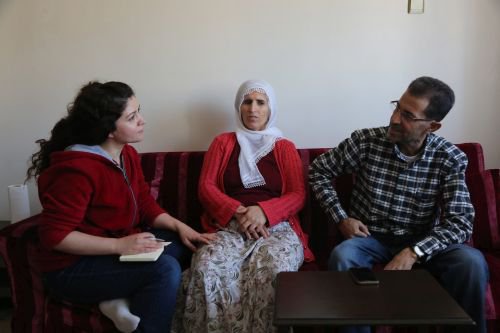
The couple Gülizar and Hanefi Doğan are living in the neighborhood 450 Evler in the Yenişehir province of central Diyarbakır. This is a collective housing complex built for earthquake victims after the Lice earthquake in 1975.
In 1988, Kurds escaping from the Ba'ath regime were settled in these houses. When those who left the neighborhood in the beginning of 1990s were forced to migrate back, they were resettled here.
While they were rather comfortable at the time of their building, these houses are now very much neglected and worn out. There is no heat insulation. The houses are heated with stoves. Doors and walls are crumbling apart due to dilapidation. The majority of these houses were given to those coming from Lice after the earthquake. The present owners of the houses are the children and grandchildren of these first owners.
10 Years with Sarmaşık Association
The Doğan family has four girls and three boys. The house they live in belongs to Hanefi Doğan’s father. The father passed away and his mother is living with them.
The family of 10 began receiving aid from Sarmaşık Food Bank in 2006. One of their two daughters also received an education grant from the association while studying in Bingöl University. One of the daughters is a sophomore in literature, the other is a freshman in civil engineering. When the association was closed, the education grant was cut as well.
Hanefi Doğan has been struggling with renal insufficiency for 11 years. For this reason he cannot work. He undergoes dialysis three days a week. He speaks about his meeting with Sarmaşık Association 11 years ago: “When I got sick, Sarmaşık Association employees came to our house and told us about the association and that they wanted to give food aid every month. The kids came and recorded our name.”
“We are neither hungry nor full”
Because her husband was ill, Gülizar Doğan was going to the food bank every month:
“Everyone had their specific day. We would go and receive our stuff. Our day was the 23rd and 24th each month. Lately, we were receiving 120 liras worth of food. Everyone was getting their fair share. We were getting provisions such as rice, wheat and pasta. Sarmaşık [Association] would send us back to our homes with shuttles. There were a lot of people from this neighborhood as all of them are poor.”
Nobody from the Doğan family who lives in the apartment is working. The father, Hanefi Doğan, is sick. The children are either going to school or too young. Hanefi Doğan’s two brothers are working in construction and are “trying to help the family”.
“We learned about the closing down of Sarmaşık [Association] from our mukhtar,” says Hanefi Doğan. “We had big difficulties. Now we are fulfilling our needs through debt. What can we say? Words fail us. Not only I am waiting like this, everyone is waiting like this.”
“I hope they reopen it”
The Doğan family is from the village of Karacak in Lice. They were forced to migrate to Diyarbakır when their village was burned in 1996. They sold what was left from the fire and came here. Hanefi Doğan, healthy back in those years, bought a pick-up with a friend and began a transportation business. “Now we are neither hungry nor full. If there were peace, we would like to go back to our village.”
Although Sarmaşık Association is closed, the employees are still calling and asking about their conditions, says Gülizar Doğan. “We were like relatives with all the employees working there. I hope they reopen it. Besides provisions, they were helping us a lot. We never received any aid from anywhere else. Sometimes the state was giving out coal, but we never received any. Even if we went there, it would be difficult. They put you in a queue and make you wait for hours. There is also favoritism.”
Atalı family, a family of four speaks
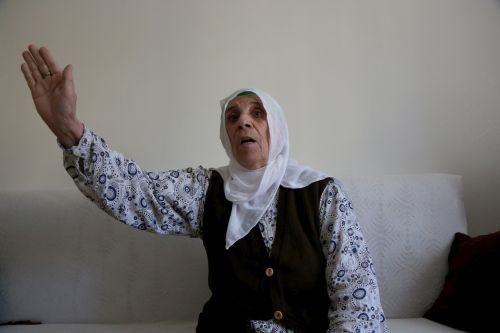
Kudret Atalı is 70 years old. They were living in Bayırlı village of Lice. Her husband got sick and died soon after their youngest daughter Rabia was born.
In 1995, their village was burned. When her youngest Rabia was three and older daughter was five years old, she was forced to migrate to central Diyarbakır by “taking nothing from the house, just her daughters on her shoulders”. They settled down in the house in the neighborhood of 450 Evler, in which they still reside. The house was given to her relatives after the earthquake. So she does not need to pay rent.
She did not pay rent, but she describes those days as follows: “We suffered from poverty a lot. We did not have furniture to put in the house. Our neighbors were helping us. We were able to keep on thanks to them. Some nights, I wasn’t able to provide food to my daughters. They were sleeping hungry. We were surviving with the aid of charitable people.”
“We were so hurt”
Sarmaşık Association entered the lives of Kudret and her daughters in 2006. When the volunteers of the association came to them, their lives became a little more comfortable. Kudret Atalı’s youngest daughter Rabia is receiving leukemia treatment.
“Sarmaşık [Association] was a big support to us. Not everything is money, I don’t speak of money. Everyone there was a big support to us. They were really good towards us. We were really sad when it was closed. My mom was the saddest.”
Kudret Atalı, the mother, learned about the decision to close down when she went to food bank to get provisions. “The door was closed. We went to the women in the neighborhood. After a short period of waiting, they told us that it was closed. We were so hurt. We went back home. We saw that place like our own home.”
Living on 500 liras
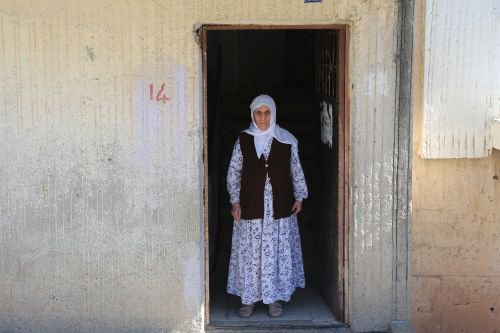
The only means of living for the household is the 500 lira widow's pension that Kudret Atalı receives once every two months. They do not have any other income. They did not apply to any other organization for aid.
Rabia Atalı tells how they survive with the 500 liras they receive every two months:
“We were receiving provisions such as oil, tomato paste and dry food from Sarmaşık [Association]. We were fulfilling other needs with the 500 liras my mother was getting. For example, we were buying cheese, vegetables and fruits.”
“After Sarmaşık [Association] was closed, a nearby shop began to give us our needs on credit. When my mother receives her widow’s pension, we pay our debt. 400 liras of her last pension went to the buffet for our debt. She was left with 100 liras. The shop is helping us a lot. But those shops are being demolished as they are built illegally. They say the trustee is demolishing them.”
“No one else has called”
Kudret Atalı could not send her daughters to school. She intended to send Rabia, but she was unable to complete the first year due to economic reasons.
Rabia says: “My mom couldn’t send us to school. If it was like now, we would have. Back then, everything was depended on having money. Even buying a book depended on money. Last year, volunteers from the municipality came and provided a 2-month literacy course. I went there and learned to read a little.”
“Last year I was really sick. I wanted to go to the village and have some fresh air, but couldn’t becauseause we don’t have a place to stay there. The house was burned. Our lives pass here inside this house. When I go out in winter, I feel worse.”
The final comment comes from Kudret Atalı: “No one other than Sarmaşık [Association] offered their hand to us until today. No one has asked if we exist or not. I still wait for Sarmaşık [Association] to open. I hope it will.”
What does the trustee think?
In 2016, a trustee was appointed to Diyarbakır Metropolitan Municipality, which had been in solidarity with Sarmaşık Association since its establishment.
We wanted to ask Cumali Atilla, the trustee, what their policies will be regarding the victims of the closure of the association.
The official replying to us on behalf of Cuma Atilla said: “Our municipality has already been providing aid and this were covered in the media. Mr. Atilla does not give interviews to the press not only regarding this issue but in general. You can ask him when he holds a press conference. However, it is not possible for him to give exclusive interviews. We can inform you when he holds the press conference, so that you can come and ask him.”
Yet trustee Atilla has not made a statement to the press on this issue as of yet. In addition to Diyarbakır Metropolitan Municipality, no plans or programs were announced by central Sur, Yenişehir and Kayapınar municipalities, to which the state also appointed trustees, regarding those facing the risk of starvation after the Sarmaşık Association was closed.
Sodiers’ relatives and the handicapped in place of those who were sacked
Within this time period, Kayapınar Municipality announced that in place of those 390 people who were fired, 40 people, comprised of the relatives of deceased and injured soldiers and the handicapped would be employed.
Dr. Mehmet Özel, who was appointed as the trustee to Yenişehir Municipality, declared that he had visited the victimized families in Şehitlik, Kooperatifler and Aziziye neighborhoods and “listened to their problems”.
The answer to the question whether there is an organization that would fill the shoes of Sarmaşık Association in quality and quantity is not promising.
Like the governorates in all other cities, the Diyarbakır Governorate is providing seasonal and short-term aids to poor and victimized families.
A citizen who does not want to provide his/her name due to security concerns speaks of governorate aid: “The governorate does not look at your face if you are not one of them, if you are not an AKP supporter. You have them write down your name, you wait in the queue for hours but they don’t give you anything. They provide [aid] in the elections but they want your vote in return. In fact our condition isn’t their concern.”
Let us remind before we wrap up. Until its closure, Sarmaşık Association had carried out its activities with the slogan of Evrim Alataş: “Don’t make them beg, let’s join hands."
Now what?
This question bears vital importance for 5,400 families, or in other words, 32,000 people total who are facing starvation. Is the right thing to do to struggle for Sarmaşık Association to meet with these people again or to immediately help these people who are preparing for hungry nights at the houses they take shelter in? Şerif Camcı, Chairman of the Board of Directors of Sarmaşık Association, says that they are in contact with the people who were receiving aid from the association. He says that one of these people has told him “I am afraid of hunger.” He says that people are still coming to the food bank. He refuses our insistence to make a call for distrustful people. He refuses individual support. He tries to explain the difference of Sarmaşık Association. He says that they did not form a “give and take relation” with the people contacting the association, and that this sort of relation creates a hierarchy. He sums up what the association is trying to do as follows: “We have always worked knowing our limitations. The responsibility for the poverty these people suffer rests on others, maybe on us. Hence, we need to share our amenities with them. The poverty in Diyarbakır is manmade. Within the scope of a concept, inequality in regional development has increased since the 90s. Thus, the poverty in our city has reached an insufferable limit. We struggled to have these people return to the lifestyle they have a right to, to have them not have to beg anyone for anything. Sarmaşık Association was not a charity organization. To our question “So now what? What are you going to do?” he replies: “We will pursue a legal struggle. Shutting down of Sarmaşık Association, above all, deprives 32,000 people, who are at risk of starvation, from their right to food, their foremost need, and to condemn them to hunger. The association was making an effort to properly fulfill a duty the state did not or could not do. To shut down Sarmaşık [Association] is to shut down conscience. The argument that would be used by the association in employing domestic and international legal mechanisms will be this: “To close down the Sarmaşık [Association] is to commit a crime against humanity. Yet the domestic legal mechanisms do not function due to state of emergency. More precisely, the struggle to claim rights under state of emergency has an ambiguous ground. Legal experts are confused regarding all the organizations closed down with statutory decrees. There are those addressing the Constitutional Court, and those saying that this is an administrative decision so the Constitutional Court can do nothing. Şerif Camcı says: “We cannot run a healthy legal struggle under these conditions. We are waiting for the state of emergency to cease. However, in order for European Court for Human Rights to evaluate the case, domestic legal mechanisms should be pursued. For this reason, the association applied to the regional administrative court. However, there is no result yet. The lawyers of the association are carrying on preparing the Sarmaşık case they will take to international arena. The lawyers will define the closing down of the association as “crime against humanity” in national and international courts. Then what does that mean? Although international judicial mechanisms are affected by international equilibriums and conjuncture, once it has been agreed that a country has “committed this crime”, the way for International Criminal Court is opened. The officials of the association are taking the condemnation of 32,000 people to starvation very seriously and are determined to pursue a legal struggle for these individuals, to whom we may be talking a lot in the future. |
(NK-ST/NU/HK)
Photos: Sertaç Kayar
***
UNEMPLOYED JOURNALISTS CHASING NEWS
1- Even Though They Speak Through Their New “Occupations,” They Are Journalists
2- Journalism is Banned under theState of Emergency
3- Germany: New Generation Diaspora/Kopuntu
4- Germany: Immigration of the Suffocated
5- The Organization that Made "The Arab Girl Looks from the Window"
6- How They Work/Cannot Work, Breaking Down the Stereotypes
7- They Marry White People to Avoid Discrimination
8- Private Rehabilitation Centers and Problems: The Example of Bingöl
9- Two Directors Discuss the “Educational Support for People with Disabilities” Practices
10- Students and Parents from Bingöl Tell of Their Experiences
11- 'Solution is Inclusion System in Education for People with Disabilities'
12- The Neighborhood of "Giaour" Doesn't Exist Anymore
13- Mıgırdıç Margosyan Couldn't Recognize His Street Amidst Ruins
14- The Ones Who Choose Life, Love, and to Struggle, Just to Spite Hatred
15- Şahika: You Don’t Become A Trans Woman Later
16- Emirhan: It's Necessary to Have An Organized Struggle and to Record Our Experiences
17- Sarmaşık Association Was Closed; Where Does This Leave the Victims?
18- An Alternative Bank: The Sarmaşık Food Bank
* The "Unemployed Journalists Chasing News" project is being realized with the financial support of Matra-Human Rights Program of Consulate General of the Kingdom of the Netherlands.




